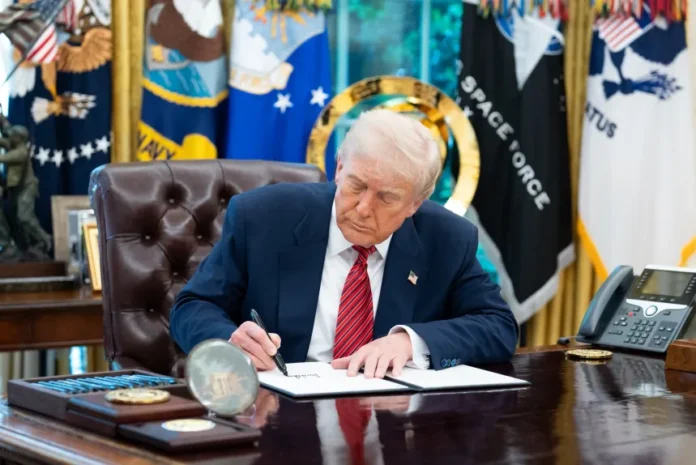Kenya has been spared from a sweeping wave of new import tariffs imposed by United States President Donald Trump on 69 countries, a move that has sent shockwaves through global trade circles and prompted urgent reactions from affected governments.
In a statement issued from the White House on Thursday, President Trump announced the introduction of new ad valorem duties ranging from 10% to 41% on imports from select trading partners. The tariffs will take effect in seven days.
“I have determined that it is necessary and appropriate to deal with the national emergency declared in Executive Order 14257 by imposing additional ad valorem duties on goods of certain trading partners at the rates set forth,” Trump said, citing economic and national security concerns.
According to the U.S. administration, several countries failed to engage meaningfully with Washington on trade-related negotiations or offered terms that did not, in the president’s view, adequately address economic imbalances.
“Some trading partners refused to engage in negotiations, while others participated but presented unsatisfactory terms,” Trump stated, adding that the U.S. is acting decisively to protect its economy and strategic interests.
While the list of affected countries includes several African nations, Kenya notably did not appear among them. Uganda, however, was included and will now face a 15% reciprocal tariff, the only East African country subjected to the new trade restrictions.
Other African countries affected include:
- 30% Tariff: South Africa, Algeria, Libya
- 25% Tariff: Tunisia
- 15% Tariff: Angola, Botswana, Cameroon, Chad, Côte d’Ivoire, Democratic Republic of the Congo, Equatorial Guinea, Ghana, Lesotho, Madagascar, Malawi, Mauritius, Mozambique, Namibia, Nigeria, Zambia, and Zimbabwe.
Globally, the most severely impacted countries include Syria (41%), Laos and Myanmar (40%), Switzerland (39%), Iraq and Serbia (35%), and Bosnia and Herzegovina (30%).
Additionally, Trump revealed that all countries not explicitly listed in the order will now face a uniform 10% U.S. import tax, a significant shift from existing trade arrangements.
Kenya’s exclusion from the list is being interpreted as a positive signal, especially given the country’s strong diplomatic and economic ties with the U.S. in recent years. Trade analysts suggest that Kenya’s continued engagement with Washington through initiatives such as the Kenya-U.S. Strategic Trade and Investment Partnership (STIP) may have shielded it from punitive measures.
However, with global markets reacting to the new tariffs and trade partners reconsidering their positions, the broader impact on global supply chains remains to be seen. Economists warn that the escalating tariff war could trigger retaliatory actions, disrupt trade flows, and increase the cost of goods for consumers worldwide.
Kenyan exporters and businesses with U.S. linkages are being urged to monitor the situation closely while taking advantage of Kenya’s current tariff-free status to strengthen their foothold in the American market.
Written By Rodney Mbua



















